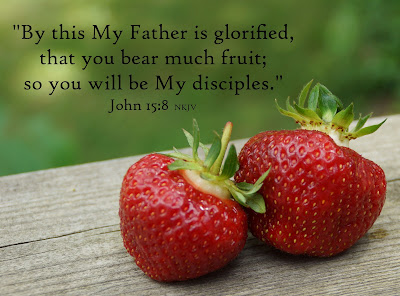“But wisdom that is from above is first pure, then peaceable, gentle, willing to yield, full of mercy and good fruits…” (James 3:17 NKJV)
Let’s take time to break down “good fruits”:
Good (in James 3:17) comes from the Greek ‘agathos’ (Strong’s #18) which means goodness
to the innermost (intrinsic and inherent); good in nature, it is good whether
it is seen to be so or not. It is moral
goodness, virtue, and the beneficial nature of actions, people, etc. In the
New Testament it often refers to the intrinsic goodness of God’s nature and His
will.
Fruits comes from
the Greek ‘karpos’ (Strong’s #2590) which means the results
and outcomes of actions. It is the evidence of one’s faith and character. It is
the result of charity (beneficial, good
conduct motivated by prayerful, good intent).
“…be an example to the believers in word, in conduct, in love, in spirit, in faith, in purity… give attention to reading, to exhortation, to doctrine… Meditate on these things; give yourself entirely to them, that your progress may be evident to all. Take heed to yourself and to the doctrine. Continue in them, for in doing this you will save both yourself and those who hear you.” (1 Timothy 4:12-13, 15-16 NKJV)
When we are full of mercy and good fruits our faith and
service to God will be evident to all, even to those who hate us, curse us,
persecute us, and spitefully use us, because we will not limit our love and
care to only those who are loving and caring toward us. This wisdom is the very opposite of the world’s wisdom. Read and
really think on Matthew 5:43-48.
“And they stoned Stephen as he was calling on God and saying, “Lord Jesus, receive my spirit.” Then he knelt down and cried out with a loud voice, “Lord, do not charge them with this sin.” And when he had said this, he fell asleep.” (Acts 7:59-60 NKJV)
We can find ourselves surrounded by unkempt ‘fields’ –
people who do not care to change nor improve (or do not know how to) because they reject God and His will – whether
it is face to face or through media (TV, radio,
movie, or social media) their weeds and rocks can infiltrate our hearts. So
we must be watchful of our hearts and work continually to keep our “soil”
tilled and tender, quickly clearing any rocks and weeds we find there (Luke 8:4-8, 11-15). We need to also keep our hearts tender enough
to look with mercy (pity and compassion)
on those around us who need to know the better way; who need salvation!
When we, in devotion to God, hear His word and humbly obey
it; when we run to Him for help to pull out a strongly-rooted weed, we will be
preparing our hearts to develop good fruits. If we keep trusting God, endure
through temptations, and remain faithful to Him and His way, we will be
preparing our hearts to be full of good fruits, and our progress will be
evident to all.
We want to abound in
good fruit, don’t we? We are supposed to bear good fruit (John 15:16) – it is not for
demonstration purposes (Matthew 6:1-7),
but it will be seen by others (Matthew
5:14-16) as we progress and behave differently than the world around us. When
we live according to God’s command and instruction found in the Bible (live and walk in the Spirit) the Spirit
will bear His fruit (our faithfulness to God’s
instruction will become obvious in all our conduct), and it will be visible to others in the love we give, the
joy we hold to, the peace we live in (with God and man), the longsuffering we
endure, the kindness we show, the goodness propelling us, the faithfulness anchoring
us, the gentleness in our word and action, and the self-control that keeps us
from serving ourselves (Galatians 5:16-26).
God is glorified when we bear much fruit – when we develop as we should (John 15:1-8, 2 Timothy 3:16-17, 2 Peter 3:18)
– bearing good fruit proves us to be disciples of Jesus (John 15:8) and it proves that we are growing in the wisdom that is
from above!
We will have endless opportunities to conduct ourselves in wise and godly ways: answering the phone and finding it’s another telemarketer, long wait
times (in-person or in our vehicle), gossip/disparaging comments in the break
room at work, when your neighbour does not behave in a nice way, when someone
is thoughtless or rude to us, when we speak to other women (or younger women, Titus 2:3-5), when we are asked for advice by a weak-in-the-faith sister in Christ, etc. etc. etc. We need to remember to exhibit wisdom that is
from above, wisdom that is full of mercy and good fruits!
Let’s work at tenderizing the hard spots, pulling the weeds,
and extracting the stones from our own hearts with daily determination and prayer
so we can flourish for God and prove His will to be good and acceptable and
perfect (Romans 12:1-2) to others
around us!! Let’s think on God’s mercy and His goodness, so we can imitate Him
as dear children (Ephesians 5:1), and
grow toward flourishing in wisdom that is from above!
You can do it! So can
I!!













